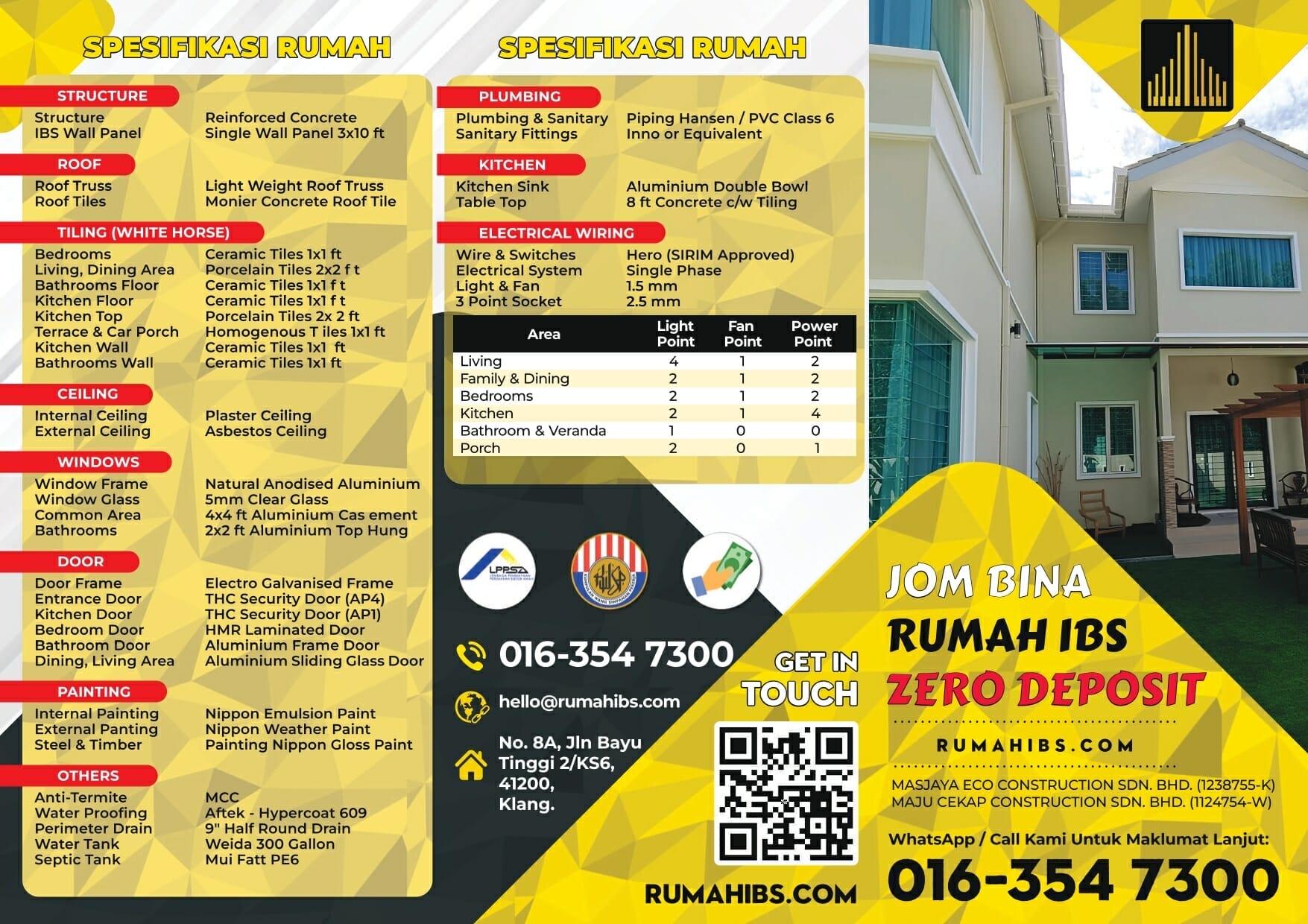
Unlocking Government Incentives for IBS Construction in Malaysia
Table of Contents
- Introduction: Embracing IBS in Malaysia
- Benefits of IBS Construction
- Government Incentives for IBS Construction
- Tax Incentives
- Grants and Funding Support
- Exemptions and Rebates
- Eligibility Criteria for Government Incentives
- How to Apply for Government Incentives
- Success Stories: Case Studies of IBS Projects
- Challenges and Solutions for IBS Construction
- Future Outlook: Expanding IBS Implementation
- Best Practices for Successful IBS Projects
- Collaborative Design and Planning
- Procurement and Supply Chain Management
- Quality Control and Monitoring
- Skilled Workforce Development
- Conclusion
- FAQs (Frequently Asked Questions)
1. Introduction: Embracing IBS in Malaysia
In Malaysia, the construction industry is experiencing a paradigm shift with the adoption of Industrialized Building Systems (IBS). IBS offers numerous advantages, including improved construction efficiency, enhanced project quality, and reduced reliance on manual labor. As the Malaysian government recognizes the potential of IBS, they have introduced various incentives to encourage its implementation across the country.
2. Benefits of IBS Construction
Implementing IBS in construction projects brings about a range of benefits that contribute to project success and long-term sustainability. These benefits include:
- Accelerated Project Timelines: IBS enables faster construction through streamlined processes and pre-fabrication of building components.
- Enhanced Construction Quality: The controlled manufacturing environment of IBS ensures higher precision, consistent quality, and reduced defects.
- Cost Savings: IBS minimizes labor requirements, reduces material wastage, and optimizes construction processes, resulting in cost savings.
- Environmental Sustainability: IBS promotes the use of eco-friendly materials, reduces construction waste, and lowers carbon emissions.
- Improved Safety: The modular nature of IBS reduces on-site construction activities, minimizing safety risks for workers.
3. Government Incentives for IBS Construction
The Malaysian government offers a range of incentives to encourage and support the adoption of IBS in construction projects. These incentives aim to alleviate financial burdens and promote the integration of IBS technologies. The key government incentives include:
3.1 Tax Incentives
The government provides tax incentives to companies involved in IBS manufacturing and construction projects. These incentives may include:
- Income Tax Exemption: Companies engaged in IBS manufacturing or IBS construction projects may enjoy income tax exemptions for a specified period.
- Investment Tax Allowance: Capital investments in IBS-related machinery, equipment, and research and development activities may qualify for tax allowances.
3.2 Grants and Funding Support
To facilitate IBS implementation, the government offers grants and funding support to eligible entities. These grants aim to encourage research and development, enhance skills and capabilities, and promote collaboration between industry players. Examples of such grants include:
- IBS Research and Development Grants: Funding for research and development initiatives in the field of IBS technology and construction methods.
- Skills Training Grants: Financial support for training programs to upskill construction industry professionals in IBS techniques and practices.
3.3 Exemptions and Rebates
The government grants exemptions or provides rebates on specific fees or charges related to IBS construction projects. These exemptions and rebates may include:
- Building Plan Approval Fees: Exemptions or rebates on building plan approval fees for projects incorporating IBS components.
- Construction Permit Fees: Reduction or exemption of construction permit fees for IBS projects.
4. Eligibility Criteria for Government Incentives
To qualify for government incentives for IBS construction, certain eligibility criteria must be met. These criteria may vary depending on the specific incentive and government agency involved. Common eligibility requirements include:
- Registration with relevant authorities or industry bodies.
- Compliance with IBS-related regulations and guidelines.
- Submission of project proposals or business plans.
- Meeting minimum investment thresholds or project scales.
5. How to Apply for Government Incentives
To unlock government incentives for IBS construction, interested parties need to follow a specific application process. The exact steps and documentation requirements may differ based on the incentive scheme and government agency. However, some general steps to apply for government incentives include:
- Research and identify relevant incentives and eligibility criteria.
- Prepare the necessary documentation, including project proposals, financial statements, and company profiles.
- Submit the application to the relevant government agency within the designated timeframe.
- Await evaluation and assessment of the application.
- Upon approval, fulfill any additional requirements and comply with reporting obligations.
6. Success Stories: Case Studies of IBS Projects
Numerous successful IBS construction projects in Malaysia have showcased the effectiveness of this approach. By highlighting the benefits and outcomes of these projects, stakeholders in the industry can gain valuable insights and inspiration. Some notable IBS success stories in Malaysia include:
- [Case Study 1]: Project description and key outcomes.
- [Case Study 2]: Project description and key outcomes.
- [Case Study 3]: Project description and key outcomes.
7. Challenges and Solutions for IBS Construction
While IBS construction offers significant advantages, it also presents unique challenges. These challenges may include limited industry awareness, lack of skilled labor, and initial investment costs. However, various solutions can address these challenges and facilitate the successful implementation of IBS. These solutions include:
- Industry-wide awareness campaigns and educational initiatives to promote the benefits of IBS.
- Collaboration between industry stakeholders, government agencies, and educational institutions to develop training programs and certifications for IBS.
- Financial assistance and incentives to alleviate initial investment costs.
- Emphasis on research and development to drive innovation and address specific challenges in IBS construction.
8. Future Outlook: Expanding IBS Implementation
The future of IBS construction in Malaysia looks promising. With the government’s continued support and growing industry awareness, the adoption of IBS is expected to increase significantly. Ongoing research and development efforts, technological advancements, and knowledge-sharing platforms will further contribute to the expansion of IBS implementation across the construction sector.
9. Best Practices for Successful IBS Projects
Implementing IBS successfully requires adherence to certain best practices. By following these practices, stakeholders can maximize the benefits of IBS construction. Some key best practices include:
9.1 Collaborative Design and Planning
Early involvement of all project stakeholders, including architects, engineers, contractors, and manufacturers, ensures smooth collaboration and optimal design integration.
9.2 Procurement and Supply Chain Management
Efficient procurement strategies, effective supply chain management, and clear communication between suppliers and contractors streamline the IBS construction process.
9.3 Quality Control and Monitoring
Implementing robust quality control measures throughout the manufacturing and construction stages ensures the delivery of high-quality IBS components and final structures.
9.4 Skilled Workforce Development
Investing in training programs and upskilling the workforce with the necessary skills and knowledge related to IBS construction improves project outcomes and long-term sustainability.
10. Conclusion
Government incentives play a crucial role in unlocking the full potential of IBS construction in Malaysia. By taking advantage of these incentives, construction stakeholders can overcome financial barriers and promote the adoption of IBS technologies. With accelerated project timelines, improved construction quality, and long-term cost savings, IBS is poised to revolutionize the construction industry in Malaysia.
11. FAQs (Frequently Asked Questions)
Here are some frequently asked questions about government incentives for IBS construction in Malaysia:
Q1: How can I determine if my project is eligible for government incentives for IBS construction?
To determine eligibility, you should research and review the specific criteria set by the government agencies offering the incentives. These criteria typically include factors such as project scale, compliance with IBS regulations, and adherence to industry guidelines.
Q2: Are government incentives available for both residential and commercial IBS projects?
Yes, government incentives for IBS construction are generally applicable to both residential and commercial projects. However, it is important to verify the specific details and eligibility requirements for each incentive scheme.
Q3: Can small and medium-sized enterprises (SMEs) benefit from government incentives for IBS construction?
Yes, SMEs are often encouraged to participate in IBS construction projects, and various incentives are available to support their involvement. These incentives may include tax exemptions, grants for skills training, and financial assistance for research and development.
Q4: How long does it usually take for the government to process and approve incentive applications?
The processing time for incentive applications can vary depending on the complexity of the project and the specific government agency. It is advisable to plan ahead and submit applications well in advance to allow for any necessary evaluation and approval processes.
Q5: Are there any ongoing initiatives to promote collaboration and knowledge-sharing in the IBS construction industry?
Yes, several initiatives and platforms promote collaboration and knowledge-sharing within the IBS construction industry in Malaysia. These include industry conferences, forums, and research institutions focused on advancing IBS technology and practices.
Unlock the potential of IBS construction in Malaysia and benefit from the government incentives available. Embrace this innovative approach to construction and contribute to a more efficient, sustainable, and prosperous industry. Act now and secure your access to valuable incentives and opportunities.
Remember, IBS construction is not just a trend; it is a transformation that will shape the future of the construction industry. Join the movement and unlock the countless benefits of IBS today!







